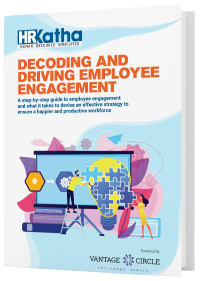Workplace Incivility- How To Deal With It?

If you are a corporate manager or leader, you're spending a lot of time thinking about your company. Company assets, employee retention, operational expenses and what not. But it's time that you start focusing on something called "workplace incivility."
What is Workplace Incivility?
You walk up to the office with your female colleague, and you hold the entryway open for her. She moves in without saying anything. Later in the day, when you go to make yourself a cup of coffee, you find an empty pot. Apparently,the last person didn't refill it.
Afterward, when you are busy in an urgent conversation over the phone, your colleagues celebrate a coworker's birthday- without you. To finish it off, you get an email with a heap load of pending work just before it's 6 PM. And tomorrow is Sunday.
All these are examples of workplace incivility.
Incivility in the workplace has been defined as "low-intensity" conduct with ambiguous intent to harm, evidenced by acts such as being mildly but regularly rude, discourteous, or impolite – or violating behavioral norms in the workplace. This description's core component is the concept of "ambiguous intent," which distinguishes incivility from other types of interpersonal mistreatment.
In a standard case of interpersonal mistreatment, an offender is committing the wrongdoing and a survivor on the receiving end. It can include physical aggression, psychological abuse and other negative employee behavior. The offender screams at the victim using verbal violence.
Here the purpose is clear. The offender plans to hurt the person in question mentally. However, for a situation of incivility, this reasonable purposefulness is not present.
For example, a worker greets his colleague, and the colleague does not reply. Here the worker may be viewed as a survivor, and his colleague may be considered a perpetrator of incivility, although it isn't clear if any harm was meant. Maybe he didn't hear his coworker, or perhaps it was an intentional gesture. This vagueness of intent makes workplace incivility a difficult behavior to understand.
Workplace Incivility and Work Engagement
Although uncivilized behavior is vague and does not have a strong purpose of harming others, it violates mutual respect's basic norms. It is linked to passive human-related and work-related outcomes. (Andersson and Pearson 1999)
Excluding words like "please " and " thank you," offensive conversations, or unkind emails may have negative effects on employee morale. It will result in mental distress, low job satisfaction, and reduced employee engagement in the long run.
Understand, most employees are not reporting incivility because they are concerned about retaliation. Instead, they stay silent and worried, resulting in lower productivity. Some other effects of incivility on employees are:
- They lower their quality of work.
- They stop offering new ideas and creativity.
- They create intentional inefficiencies.
- They get emotional frequently.
- They take their frustration out on customers and family members.
- They spend less time in the workplace.
- They look for other opportunities.
7 Tips To Deal With Workplace Incivility
1. Create a model that values civility
When it comes to creating a civility model, employers should develop policies and codes of conduct. It should be designed in a way to encourage employees and engage them positively. Leaders must demonstrate the behavior patterns that they want to see in their teammates.
Those standards should be communicated to employees to understand how to show consistent respect and concern for others. No loud tones, no slashing comments, no door smashing, no complaining about people. Workers who practice civility should be recognized and rewarded so that they all see it as a significant contribution.
Even integrating civility training into the workforce growth program is a smart idea. That way, you continuously reinforce the good attitudes you expect from your company's workers during their tenure.
Related Article: 8 Super Useful Tips To Improve Respect In The Workplace
2. Screen prospective hires.
You don’t hire for skills, you hire for attitude. You can always teach skills. - Simon Sinek
It will lead to solving the problem at its root. One way of creating a civilized workplace culture is by purposely recruiting people who display signs of good conduct. Employers should test their personality traits and conflict management styles. They should look out for how the potential hires handle everyone they meet, from the receptionist to the future teammates.
People who reflect a cooperative conflict resolution style are less likely to participate in uncivilized behaviors. On the other hand, those who use a dominant form of conflict management style are more likely to show incivility goals. One can also use their network to dig past the toxic employees' resumes from their past employers and coworkers.
3. Increase awareness of workplace incivility.
The increasing trend of workplace incivility is not even known to most employees. Leaders must develop awareness by describing what incivility is in the workplace. You should explain what it looks like, and share its impacts after thorough research. It will highlight the urgency, resolve, and tackle the problem before it gets out of hand.
4. Avoid considering excuses.
Few common excuses for rudeness include:
- "We all face it in the workplace. Welcome to the club."
- "That's just the way he is. Deal with him."
- "It's nothing. Ignore it."
- "She is the boss. You have to put up with her."
- "I'd stay quiet if I were you."
When an employee raises complaints, press them to describe the issue entirely. He/she can present some valid points, so never dismiss or write off what they have to say. Any excuse on your part will make the employee feel uncomfortable and excluded. It will also cost your business much more than you could think.
It would help if you encouraged the employees to express their dissatisfaction when witnessing rude behavior. It can be face-to-face conversations , email communication, or virtual contact via telephone or video meetings. Create a culture that will ensure that you care and are concerned for your employees.
5. Address disrespectful behavior before it spreads.
Managers need to pay attention and get better at letting rude people know it's not okay. If you don't hold the perpetrator accountable, the incivility will grow, and negative attitudes will spread through the team.
If you really want to confront, ask yourself: Do you feel in control of the situation before you speak to the person? Prepare for a debate. Think of a nice time and setting that will make you more relaxed in. Be prepared for an emotional reaction.
Managers must make it known that the team will not accept uncivil conduct and then be prepared to take action. On witnessing incivility, you might need to take disciplinary actions as well.
Here, the ability to provide clear constructive feedback and coaching are two skills that managers need to learn. It will help to create effective conversations leading to understanding, improvement, and increased productivity.
Also learn about the 5 Useful Tips On How To Give Constructive Criticism
6. Encourage feedback from employees.
Feedback on an individual basis can really shape a work environment.- Christopher Rosen.
Organizational leaders must build a healthy work atmosphere such that workers would not be afraid to raise concerns. A proper communication channel can help in giving and receiving clear feedback on what workplace civil behaviors are expected.
Related Article: Effective Feedback: Key Elements to Keep in Mind
7. Look at the bigger picture.
Current events, such as political debates, social problems, protests, and strikes may cause frustration and lead workers to lose concentration. They become upset, act out, and might also take to workplace bullying. News channels, public figures, and their negative have a long-lasting impact on business and your employees.
As a manager or employer, your aim should be to avoid the outside world in your workplace. It would help if you talked to the employees who look stressed and distracted by an external factor. You should offer your company’s Employee Assistance Program for workers who show anxiety, or distress due to outside issues.
Overall, corporate leaders should take long term steps to preserve a civilian atmosphere. Fostering civility as the only workplace behavior can mitigate adverse outcomes for workers and improve organizational effectiveness.

Vantage Circle is a simple AI-powered Rewards & Recognition Platform for upgrading your employee experience and engagement for better productivity.






